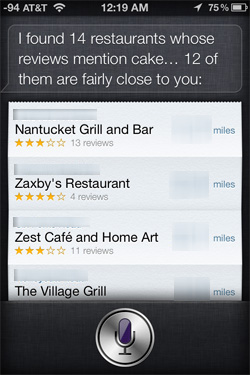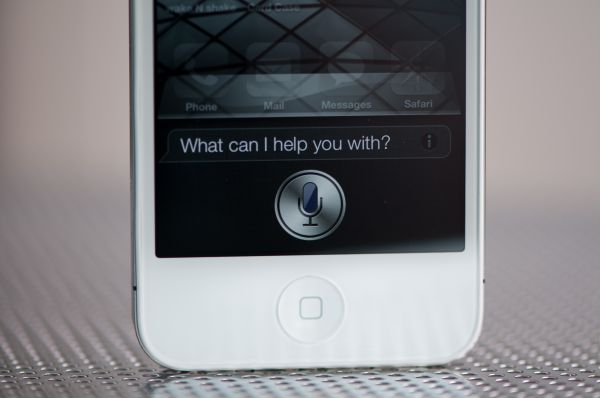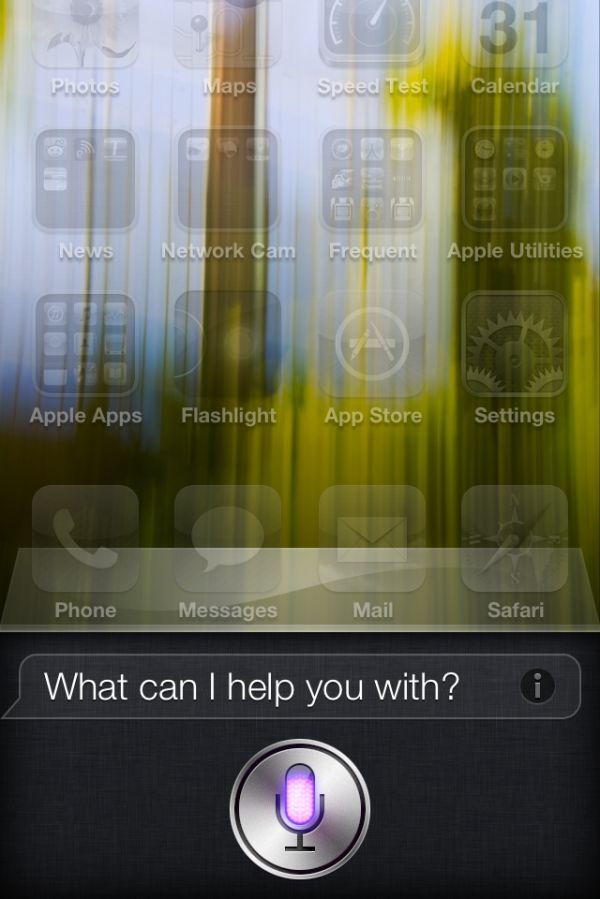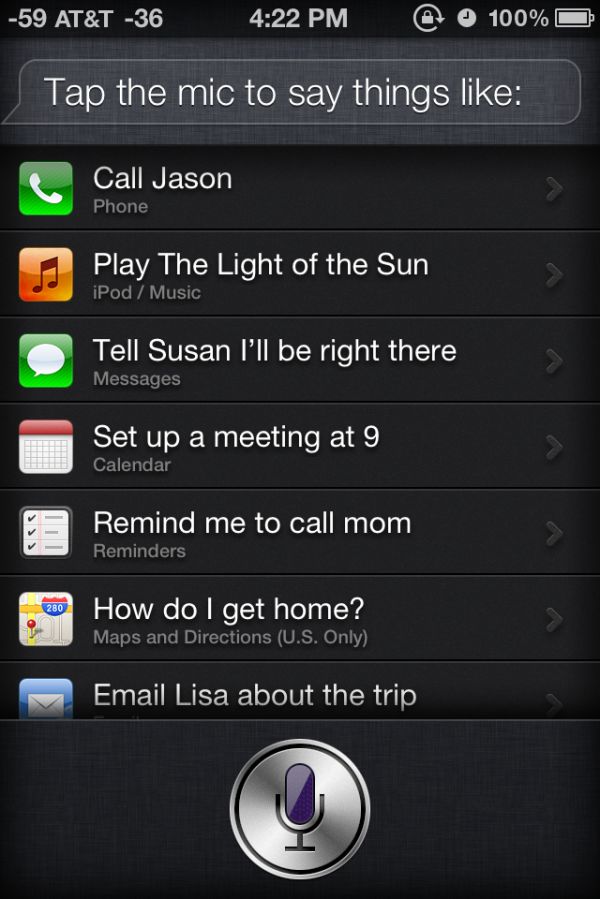Apple iPhone 4S: Thoroughly Reviewed
by Anand Lal Shimpi & Brian Klug on October 31, 2011 7:45 PM EST- Posted in
- Smartphones
- Apple
- Mobile
- iPhone
- iPhone 4S
Siri
Apple can credit much of its success to not only delivering good hardware, but using the hardware to develop new software experiences. With the 4S and iOS 5, most of the software experiences are available on older hardware - the sole exception being Siri.
The expectation that Apple will always deliver more than just a hardware upgrade is likely what made Siri a 4S exclusive (that and controlling the rollout as to not overly burden Apple's servers). The work carried out on the phone itself is minimal compared to what’s done server-side. A quick look at CPU utilization while running a simple Siri query (how many meters are in a mile) reveals the most stressful part of the process is animating the results on the screen. The display process is multithreaded but even then peak usage rarely steps above a single CPU core, in other words - this could have been done on the 4.
Siri is the logical next step from after the existing voice engine on the iPhone 4, which I doubt many people used on a day to day basis. Functionality was limited to a small laundry list of operations, and if you wandered outside the confines of those voice commands, you were left out of luck. I can count the number of times I did anything with the iPhone 4 voice commands on one hand.
Siri originally started as a standalone application, where it initially impressed with the ability to take a conversational approach to voice commands. Apple quickly acquired Siri, built it into iOS 5, and enabled the feature on just the iPhone 4S. At present, the feature only works for English (US, UK, Australia), French, and German, though in 2012 the language engine will also be compatible with Japanese, Chinese, Korean, Italian, and Spanish.
Hold the phone up to your head when not in a call, or long press the home button (which was the previous voice command action) and you’ll get Siri’s purple microphone and a circle button. If you’re familiar with Android’s voice dialogs, this visualization is pretty similar, though the functionality is very different.
Siri also works with bluetooth headsets and normal headsets, including the Apple-supplied button plus microphone earbuds. Normally Siri doesn’t read text messages or emails, but if you have a headset, it then reads everything back to you and becomes a much more powerful hands-free tool. Hold down the action button on a bluetooth earpiece or on the Apple earbud cable, and it will toggle Siri mode the same as holding the home button down. Bluetooth functionality works pretty well, though there’s added latency each time the earpiece audio link is established and torn down that can be unnerving.
Siri leverages Yelp for businesses/restaurants and Wolfram Alpha for any queries that require computation. It is interesting to think of Siri as Apple’s foray into search. Siri isn’t designed to monetize search, but any queries run through Siri definitely don’t line Google’s pockets. Given how much Google depends on search for its revenues and the growth of its businesses, Siri may be viewed as a competitive threat. Perhaps that’s why we don’t see Siri using Google for search?
There are two components to every Siri interaction: your query, and the results it returns. Where Siri is truly impressive is in its ability to understand your queries. You can ask it to tell you the closest Italian restaurants, or just utter the phrase “I want cake” and get a list of options in the area. For the former, Siri just looks for restaurants classified as Italian, for the latter it looks for restaurants whose Yelp reviews mention the word cake. Siri’s ability to dissect and handle the query is impressive, unfortunately its usefulness is gated by how active Yelp users are in your area. Yelp use in Raleigh is disappointing overall, which in turn hurts Siri’s ability to recommend what I’m looking for.


When it works, it works very well. There happen to be a lot of burger options where I live and simply asking Siri “what’s the best burger joint” returned a fairly accurate ranking of my options. The same goes for pizza, but my cake query didn’t really give me useful results either in Raleigh or Durham. Siri is only as smart as the databases that it relies on, and unfortunately simply looking for reviews that mention cake isn’t the best way to direct you to sugary goodness.


The computation aspect of Siri is pretty useful. You can ask Siri simple conversion questions like “how many quarts are in a gallon” or something more complex like “how much is a 15% tip for $247 for five people”. In the case of the latter you’ll get the total tip amount, the per-person share as well as other tip amounts (e.g. 10%, 20%). Take it one step further and ask Siri to tell you when it’s customary to tip and you quickly run into a wall. In this case it’s not the data but Siri’s awareness of the question that’s limiting you.


Given how frequently I’m in meetings, one of the most useful aspects of Siri to me personally is its ability to schedule meetings. I can tell Siri to schedule a meeting with AMD at 2PM Pacific and it’ll offer to create the appointment in my calendar for me. If there’s a conflict, Siri offers resolution options. Combine that with seamless calendar syncing via iCloud and you’ve got a pretty powerful tool. Siri also handles US time zones very well. As you may have gathered from the line above, I can tell Siri to schedule a meeting in a different time zone without having to do the conversion myself. The time zone support breaks down once you go beyond the US unfortunately.

Siri is similarly great for reminders. Using iOS 5’s location based triggers and by simply giving Siri some information ahead of time (e.g. telling it where home and work are in your address book), you can have Siri remind you to buy milk when you leave work or buy a cat when you leave home.
Siri’s voice recognition engine works pretty well out of the box, but also learns individual voice characteristics and dialects on a larger scale. This individually trained language data can optionally be reset as well by just toggling Siri off and back on. I trained Siri for about a week, reset the data, and went through a few commands - it’s obvious that it does tailor a voice profile after a while.
Siri is surprisingly good at following along in conversations, but ultimately it’s still limited to a certain set of tasks, though the list is pretty big. Things like emailing a contact, sending text messages, responding to messages, setting alarms, reminders, and appointments, playing music (based on artist, album, or title), looking basic things up, and then features that are enabled through ties into Yelp and WolframAlpha. Much of what I ask Siri that isn’t an obvious phone function (text, call, email) ends up being directed into a Yelp search, and the depth of interesting redirects here are impressive - everything from telling Siri you’ve soiled yourself (which sends you clothing stores), that you need drugs (which finds addiction treatment centers) to specific things like wanting a certain genre of food nearby. It’s clear that the team responsible for Siri had a lot of fun, and by now the number of interesting easter eggs have been pretty well documented all over the web.



















199 Comments
View All Comments
Formul - Monday, October 31, 2011 - link
There is about a dozen fairly similar android phones every month. As iPhone gets refreshed just once every year (this time year and a half) and has bigger market than any single android phone out there it makes sense to make the review thorough. I guess Nexus Prime and even Razer will get similar lengthy reviewsa ... as did many other android phones before that (galaxy s2 for example had about the same as this one).You are the one biased here. Counting the number of android articles on any gadget blog will seriously outpace the iPhone by far. You should shut up and read what you want, no one is forcing you to read this blog or any particular article on it. I dont read android articles, i dont care about android all that much. Why do you have to troll here if it does not interest you after all?
Anand Lal Shimpi - Monday, October 31, 2011 - link
I believe we did just that for the Galaxy S 2 review:http://www.anandtech.com/show/4686/samsung-galaxy-...
We don't have the RAZR, Galaxy Nexus or S2 Skyrocket, but we typically do a deep dive whenever there's a new platform transition or something truly unique to look at.
Take care,
Anand
LordSojar - Tuesday, November 1, 2011 - link
Hmm, touche Anand, I had forgotten about how detailed the S2 review was.The RAZR doesn't warrant a particularly detailed review I suppose, but I think the S2 Skyrocket might warrant a detailed antenna review etc considering the transition to LTE along with, what should be a major change to the antenna and should (I think) have QC's MDM9615 or MDM8215 chips in it... which is a big deal considering those could yield not only significant speed gains along with an antenna update, but some major throughput.
Cheers
doobydoo - Tuesday, November 1, 2011 - link
'Samsung releases a new phone that has overall better features, faster CPU, faster NAND, a different and arguably better (or at least equal) screen'I hope you are comparing to the OLD Samsung, in this sentence, rather than comparing to the iPhone 4S.
The CPU/GPU performance of the iPhone 4S is not comparable to the Galaxy S2, and I would argue the features are very much superior too.
Which, incidentally, along with the dual-antenna design, Siri, brand new camera, makes the iPhone 4S much more of a step up than the Samsung Galaxy to Samsung Galaxy S2. (The Galaxy S was about the same performance as the iPhone 4. The Galaxy S2 is slower than the iPhone 4S, therefore iPhone 4S is a bigger upgrade).
And of course, as Anand said, they thoroughly review most phones, and as the other poster says, the Android phones come out way more often so over the same length of time they get at least as much if not more coverage.
Tetracycloide - Tuesday, November 1, 2011 - link
The Galaxy S2 released in May. The 4S released in October. The next Galaxy phone, the generation the 4S is actually going to compete with, is the Galaxy Nexus. What I'm saying is your point would hold more water (or any at all) if Samsung didn't make 2 upgrades in the space of time it took Apple to do 1 so the differential between generations is hardly an apples to apples comparison (pun intended).thunng8 - Tuesday, November 1, 2011 - link
But the Galaxy Nexus isn't any faster than the S2. The main benefit is the new operating system and higher resolution screen.The Nexus is actually a significant step backwards from the S2 in terms of camera (likely from the samples on the prototype) and GPU (definitely since it is using the SGX540) performance
doobydoo - Wednesday, November 2, 2011 - link
Release dates will not stop phone users comparing the iPhone 4S to the Androids released in March 2012, just like they compared all the Androids over the last 17 months to the iPhone 4.The iPhone 4S, right now, is competing with the Galaxy S2 directly.
The Nexus Prime, as the other comment alluded to, is a significant downgrade from the Samsung Galaxy S2. Indeed, it uses the same GPU as used in the much older Samsung Galaxy S (albeit clocked higher).
The Galaxy S to S2 took approximately a year inbetween generations (June 2010 to May 2011), which is very much in line with the typical Apple release cycle of annually (this year was the exception). Even this year, with the extended timeline between iPhone 4 and 4S, Samsung didn't make 2 upgrades during that time. Your point would hold more water (or any at all) if it had.
Tetracycloide - Wednesday, November 2, 2011 - link
It's obvious you're not making a real comparison between current products but instead of admitting that you pretend it's a non-issue and then strangely fought that issue anyway by suggesting I'm not actually right to call you out on these shenanigans. So thanks for being obtuse about this, it makes it much easier to dismiss your position as that of an irrational fan-boy (at least it does when combined with the condescension in some of the other threads you've commented on here).doobydoo - Friday, December 2, 2011 - link
'It's obvious you're not making a real comparison between current products'Erm, huh?
That's EXACTLY what I'm doing.
What YOU'RE doing is asking is to compare a phone which isn't even out yet with a phone which is. You're trying to 'pretend it's a non-issue' that the phone you say the iPhone 4S should be compared with wasn't even out when this discussion started. THAT is the definition of fanboy-ism. It's like the constant like of Android fans 'x WILL be better when it eventually comes out' - and THAT is obtuse.
So, the only comments which can be dismissed are YOUR fanboy comments about 'x phone released in x months will be better'. Turns out you were wrong anyway, but that's irrelevant - the bottom line is you don't want iPhone to be compared to CURRENT Android phones, but instead compared to FUTURE ones.
Rational, much?
As it happens, it's out now, and isn't even much of an improvement on the Samsung Galaxy S2
Lucian Armasu - Wednesday, November 2, 2011 - link
The cameras seem to be about the same, according to Anand. I've actually found the SGS II camera to be a bit better in photo comparisons. Siri? I still think it's more of a gimmick for now. Maybe in 5-10 years it will be actually useful. Once the novelty expires, people will barely even use it in a few months. The same happened with FaceTime which everyone went crazy about at launch, and then they stopped using it completely.The CPU of the SGS2 IS faster than iPhone 4S CPU. There's no way Apple managed to get a 50% performance improvement for the same Cortex A9 chip that Samsung is using.
I think Anand can confirm this. He wasn't very clear in the review. He was only talking about the improvements it gets over the old Cortex A8.